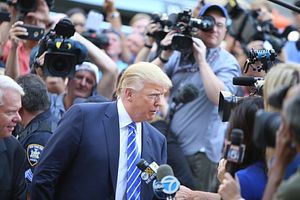An editorial in the Chinese state owned Global Times from March 14 was coruscating in its criticisms of both Republican front runner candidate Donald Trump and the system that allowed someone GT branded a “racist and extremist” and a “clown” to rise to that position. The editorial, with no little schadenfreude, went on to declare that “the U.S. had better watch itself for not being a source of destructive forces against world peace, more than pointing fingers at other countries for their so-called nationalism and tyranny.”
The Global Times, like media worldwide on the populist end of the readership spectrum, does not do nuance. There are many complex forces at work behind the rise of Trump,which GT does not acknowledge, even in passing. Even so, it is clear that many in China (and elsewhere for that matter) look at the onward march of a candidate as provocative, visceral, and manipulative as Trump is with astonishment. Surely, they ask, there must be something wrong for the system to allow a person like this to get the electoral results he has so far managed.
Chinese responses to Trump have to also factor in one element that is very powerful and pertinent – the role of charisma in his candidacy. Trump is a vast ego, almost without boundaries. His campaign message is about Trump – as a symbol of the American dream, of American success, of America’s tangible image in the world. His personality simplifies vastly complicated issues like the challenges the United States is facing to its geopolitical position, the enormous issues within its own internal demographics, and the real problems of what role a professional political class plays when broader society so evidently both needs them and detests them. The core Trump message is that simply by voting for him, all these problems will be soluble. If you believe in miracles, perhaps so. But the odds are that, if he does make it to the White House, he will become as stymied as his predecessors in the system he wants to upturn.
Chinese observers must look at the way Trump’s charisma, his use of his public profile and personality, simply override all these other issues in electors’ heads in the United States and feel rising unease. Rational argument, logic, and realism all seem to be thrown to the wind in a world where someone like Trump can triumph. Instead, many people who in their daily lives would be cautious and careful are willing to suspend all their normal habits and reservations and take a chance on a person who has never once held even the most unimportant public office and whose business track record is, at best, complex and contested. Voters will do this partly because they privilege and believe charisma and its promises over anything else.
Chinese have some qualifications for speaking about the perils of charismatic politics and where it might lead. Under Mao Zedong, for instance, they had charismatic leadership in spades. Mao’s personality annexed all political life in the country from the mid 1960s onwards, to such an extent that he almost forced the Party out of the way. This created a devastating unity, for sure. But its human costs were also deadly – famine, violence, intolerance, the crushing of creativity or any form of individualism, and a toll of endless personal misery that still seeps from wounds to this day.
Xi Jinping is no Mao. China now is not the China it was in the Maoist era. Even so, charisma is still a resource worth exploiting, and that seems to be part of Xi’s tactics. Xi certainly looks and sounds like someone who knows where he is heading, and who has no problem putting himself at the forefront of almost all state action and behavior. It is odd that comments on this sort of grandiosity did not figure more trenchantly in the so-called letter of criticism from Party members that appeared briefly on a website at the end of March – only to be pulled down hastily. Xi is banking heavily on charisma, and on how charisma can appeal to the public and make them cooperate with government ideas, even to the point of becoming zealous collaborators.
The precedent of Mao, however, is very salient here. Where precisely did this earlier project of Chinese charismatic politics end up? With political and economic bankruptcy, with the Party itself on its knees, its elite leadership divided, and society exhausted, impoverished, and restive. Charisma in Chinese politics had never had a good name since. Deng Xiaoping and Hu Jintao were scrupulous in avoiding its pitfalls. Even the showman Jiang Zemin used it sparingly. If Xi wants to usher in a new era of charismatic, leadership-centered politics in China, then he is undertaking a huge gamble.
When Chinese people look with concern at the phenomenon of Trump in the United States, it may well be something else entirely that is worrying them — the rise closer to home of a visceral, personality-driven style leadership going for the emotions rather than rationality, and in the process rewriting the normal laws of domestic politics.

































